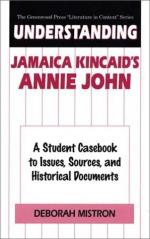|
This section contains 6,930 words (approx. 24 pages at 300 words per page) |

|
SOURCE: “Anger in a Small Place: Jamaica Kincaid's Cultural Critique of Antigua,” in College Literature, Vol. 22, No. 1, February, 1995, pp. 91–103.
In the following essay, Byerman examines the significance of anger, resentment, and resistance in Kincaid's fiction as a response to colonial oppression and cultural loss in Antiguan society, particularly as experienced by women and symbolized by the mother-daughter relationship.
Jamaica Kincaid's first three works—At the Bottom of the River (1983), Annie John (1985), and A Small Place (1988)—which are focused on life on Antigua, Kincaid's native island, reflect a deep hostility toward that world. Though the books employ differing discourses—fiction and polemic—and focus on varying aspects of life there, they share an anger about that island that the author makes little effort to conceal. That anger is about colonialism and its effects, especially in A Small Place. But more fundamentally, these works challenge the assumptions of Antiguan culture...
|
This section contains 6,930 words (approx. 24 pages at 300 words per page) |

|


